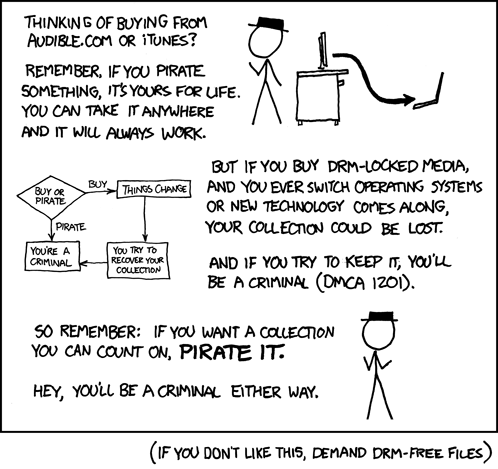While discussing the internet’s Feudalisation, this week’s
area of research raised a topic I have been passionately outspoken about since
it’s inception; digital rights management and the way it inconveniences the end
user to the point that they are driven to piracy. The following comic produced
by Randall Monroe of xkcd perfectly illustrates my main gripe with this
intrusive and ineffective form of copyright protection.
 |
| http://xkcd.com/488/ |
In the current digital market, obtaining your preferred form
of media through legitimate channels leaves you with a product inferior to that
you would find on any number of so-called ‘pirating’ websites. Did you enjoy
that song you bought on iTunes so much that you wish to load it onto your MP3
player not produced by Apple and listen to it on the move? Too bad. Feel like
watching that DVD you purchased while overseas in a country that is in another
arbitrary ‘region’ to your own? Good luck. These are just a few examples of how
new technologies are being hamstrung to the detriment of users who chose to not
take the much easier route of downloading content illegally.
Doctorow (2012) outlines the two key problems with DRM that
have been obvious since it’s first implementation in the early 90s and are
still issues today; the inconvenience they cause the average users who attempt
to operate with legitimacy and the ease with which even the mildly tech-savvy
can get around them. Akester’s (2009) empirical study into the conflicts
between freedom of expression and DRM raises a number of relevant examples, such
as the experience of Lynn Holdsworth, a visually impaired individual who
purchased a digital version of the Bible through Amazon.com and was refused a
refund after DRM prevented her screen reader application from providing an
audio file. After lengthy discussions with both Amazon.com and the publisher
responsible for the e-Book, Lynn was left with no alternative but to illegally
download a copy of the work (Akester 2009, pp.47-49).
In our tutorial we discussed legitimate forms of attaining
content and Charlotte made the point that by downloading content illegally, I
was taking money out of the pockets of producers. While this might be true, I
morally object to paying for anything, digital content or any other product,
that I am then forced to use in a particular way. I’m sure the day will come
when digital distribution networks are finally up to scratch and at that time,
I will happily lay down my micro-transactions and pay for what I consume. Until
that day comes however, I say; power to the pirates!
| http://thepiratebay.sx/ |
References:
Akester, P 2009, ‘Technological accommodation of conflicts
between freedom of expression and DRM: the first empirical assessment’, University of Cambridge, accessed
3/5/2013, http://www.law.cam.ac.uk/faculty-resources/summary/technological-accommodation-of-conflicts-between-freedom-of-expression-and-drm-the-first-empirical-assessment/6286
Doctorow, C 2012, ‘Lockdown: The coming war on general
purpose computing’, weblog post, Boing Boing, accessed 3/5/2013, http://boingboing.net/2012/01/10/lockdown.html
No comments:
Post a Comment